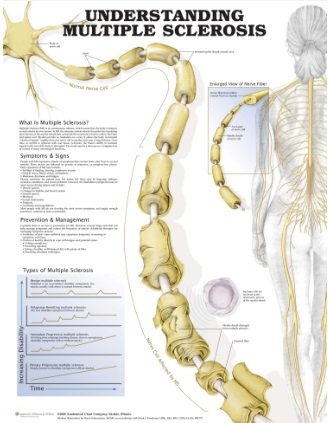The Clinical Practice of Neurological and Neurosurgical Nursing
Out of all the textbooks we have provided for you to browse, this is the chapter we would recommend first to someone who is just beginning to thoroughly explore MS.This chapter provides a comprehensive overview of the disease in language that, although you may find it slow going at first, is reasonably easy to understand.
Don’t be put off by the technical terms that healthcare professionals use: as you become accustomed to seeing these terms, they will become much less intimidating to you. Take your time in reading this chapter, and use it as a springboard to learning more about your disease as you explore the other textbook chapters we have provided.
What not to miss:
- Take some time to read and re-read the section “Pathogenesis and Pathophysiology.” Although the section includes some fairly technical terms, what you learn in this section will give you a basic understanding of the complex disease processes underlying MS.
- Look at Table 32-2 “2010 Revised McDonald Multiple Sclerosis Diagnostic Criteria.” This table summarizes the guidelines your healthcare provider used in diagnosing MS (This table has since been updated, which you can view here.)
- Compare Table 32-1 “Four Categories of Multiple Sclerosis (MS) Based on Clinical Course” to Figure 32-3 “Types of Multiple Sclerosis.” These table and figure will help you understand the different categories of MS>[LM3]
- Review Table 32-3 “Drug Treatment Options for Multiple Sclerosis.” This table lists most of the currently approved drug therapies for MS. Note that the name of the drug compound (often called the “generic name”) is listed first with the drug’s brand name following in parentheses. Your healthcare provider may refer to a drug by its brand name, but usually journal articles and textbooks use the generic name. This is because brand names can vary from country to country. It is helpful to become familiar with both the generic and brand names of the drugs your healthcare provider has prescribed for you. You may also want to visit http://ms-coalition.org to see those therapies that have been approved since the publication of this book as well as those drugs pending approval by the FDA.
Remember, everyone learns at their own pace. Developing a deeper understanding of your disease requires patience and, often, re-reading unfamiliar parts a couple of times. You will surprise yourself with how much knowledge you develop.
Read More

